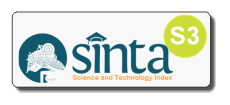Parents’ Acceptance of Children with Autism Spectrum Disorder (ASD) in Pontianak City
Abstract
This study aims to describe parents’ acceptance of children with autism spectrum disorder (ASD) in Pontianak City. The research method used is descriptive with a cross-sectional approach. The research instruments used were the Parental Acceptance-Rejection Questionnaire (PARQ) and the Demographic Data Questionnaire. The respondents who participated in this study were 40 parents, consisting of 16 fathers and 24 mothers. A total of 18 (45 percent) parents accepted, and 22 (55 percent) refused. Most of the respondents were in the category of early middle age (65 percent), married (92 percent), high school graduates (50 percent), housewives/not working (35 percent), and high and very high income (35 percent). The characteristics of parents who accept their child’s condition are early middle age adults, married, high school graduates, housewives/not working, and have moderate-income levels, while the characteristics of parents who refuse are the same as those who accept but have high-income levels. The process of accepting parents who have children with ASD is not easy. Fathers and mothers have different acceptance of children with ASD. Therefore, it is important to know parents’ acceptance of children with ASD starting from the child’s initial diagnosis so that it can help parents make decisions regarding the treatment of children with ASD.
Full Text:
PDFReferences
American Psychiatric Association. (2013). Diagnostic and Statistical Manual of Mental Disorder: Fifth Edition (DSM-5). Washington, DC: American Psychiatric Publishing.
Chen, Y., Peng, Y., & Fang, P. (2016). Emotional Intelligence Mediates the Relationship between Age and Subjective Well-Being. The International Journal of Aging and Human Development, 83(2), 91–107. https://doi.org/10.1177/0091415016648705
Christensen, D. L., Braun, K. V. N., Baio, J., Bilder, D., Charles, J., Constantino, J. N., Daniels, J., Durkin, M. S., Fitzgerald, R. T., Kurzius-Spencer, M., Lee, L.-C., Pettygrove, S., Robinson, C., Schulz, E., Wells, C., Wingate, M. S., Zahorodny, W., & Yeargin-Allsopp, M. (2018). Prevalence and Characteristics of Autism Spectrum Disorder Among Children Aged 8 Years—Autism and Developmental Disabilities Monitoring Network, 11 Sites, United States, 2012. MMWR. Surveillance Summaries, 65(13), 1–23. https://doi.org/10.15585/mmwr.ss6513a1
Faradina, N. (2016). Penerimaan Diri Pada Orang Tua yang Memiliki Anak Berkebutuhan Khusus. Psikoborneo: Jurnal Ilmiah Psikologi, 4(1), Article 1. https://doi.org/10.30872/psikoborneo.v4i1.3925
Fitrianingrum, I., Ediati, A., Winarni, T. I., & Faradz, S. M. (2021). The Evaluation of Parental Acceptance Towards Children with Sex Chromosomal Disorders of Sex Development Using A Mixed-Method. Journal of Biomedicine and Translational Research, 7(1), 14–21. https://ejournal2.undip.ac.id/index.php/jbtr/article/view/10710
Gusrianti, E., Winarni, T. I., & Faradz, S. M. (2018). Factors Affecting Parents’ Acceptance towards Children with Familial Intellectual Disability. Journal of Biomedicine and Translational Research, 4(2), 45–50. https://doi.org/10.14710/jbtr.v4i2.3659
Kosasih, H. (2017). Gambaran Penerimaan Orang Tua dengan Anak Retardasi Mental di Sekolah Luar Biasa (SLB) C “DG” dan SLB C “SJ.” Psibernetika, 9(1), Article 1. https://doi.org/10.30813/psibernetika.v9i1.475
Maenner, M. J., Shaw, K. A., Baio, J., Washington, A., Patrick, M., DiRienzo, M., Christensen, D. L., Wiggins, L. D., Pettygrove, S., Andrews, J. G., Lopez, M., Hudson, A., Baroud, T., Schwenk, Y., White, T., Rosenberg, C. R., Lee, L.-C., Harrington, R. A., Huston, M., … Dietz, P. M. (2020). Prevalence of Autism Spectrum Disorder Among Children Aged 8 Years—Autism and Developmental Disabilities Monitoring Network, 11 Sites, United States, 2016. MMWR. Surveillance Summaries, 69(4), 1–12. https://doi.org/10.15585/mmwr.ss6904a1
Pradana, A. P., & Kustanti, E. R. (2017). Hubungan Antara Dukungan Sosial Suami dengan Psychological Well-Being pada Ibu yang Memiliki Anak Autisme. Jurnal EMPATI, 6(2), Article 2. https://doi.org/10.14710/empati.2017.19734
Pujiastuti, U. (2014). Hubungan Antara Dukungan Ayah, Pengetahuan Ibu tentang Anak Autis dan Religiusitas (Dimensi Praktik Agama) dengan Penerimaan Ibu terhadap Anak Autis [Bachelor’s thesis, Universitas Muhammadiyah Surakarta]. https://doi.org/10/Lampiran.pdf
Riany, Y. E., Cuskelly, M., & Meredith, P. (2016). Cultural Beliefs about Autism in Indonesia. International Journal of Disability, Development and Education, 63(6), 623–640. https://doi.org/10.1080/1034912X.2016.1142069
Rohner, R. P. (2021). Introduction to Interpersonal Acceptance-Rejection Theory (IPARTheory) and Evidence. Online Readings in Psychology and Culture, 6(1). https://doi.org/10.9707/2307-0919.1055
Rohner, R. P., & Ali, S. (2020). Parental Acceptance-Rejection Questionnaire (PARQ). In V. Zeigler-Hill & T. K. Shackelford (Eds.), Encyclopedia of Personality and Individual Differences (pp. 3425–3427). Cham: Springer International Publishing. https://doi.org/10.1007/978-3-319-24612-3_56
Rupu, N. Y. (2015). Faktor-Faktor yang Mempengaruhi Penerimaan Orang Tua Anak Retardasi Mental di SLB Negeri Pohuwato [Bachelor’s thesis, Universitas Negeri Gorontalo]. https://repository.ung.ac.id/skripsi/show/841411009/faktor-faktor-yang-mempengaruhi-penerimaan-orang-tua-anak-retardasi-mental-di-slb-negeri-pohuwato.html
Santoso, M. B., Wibhawa, B., & Ishartono, I. (2018). Penerimaan Orang Tua terhadap Anak dengan Retardasi Mental. Share : Social Work Journal, 8(1), Article 1. https://doi.org/10.24198/share.v8i1.16111
Sudarmintawan, P. S. I., & Suarya, L. M. K. S. (2018). Gambaran Penerimaan Ibu dengan Anak Autisme serta Penerapan terhadap Diet Bebas Gluten dan Kasein. Jurnal Psikologi Udayana, Juni 2018, 72–86. https://ojs.unud.ac.id/index.php/psikologi/article/view/40401
Sugara, B., Widyatmoko, D., Prakoso, B. S., & Saputro, D. M. (2018). Penerapan Algoritma C4.5 untuk Deteksi Dini Gangguan Autisme pada Anak. Proceeding SENTIKA 2018, 87–96.
Susanti, H. (2015). Representasi Konsep Diri Orang Tua yang Memiliki Anak Autis. Jurnal Ilmu Komunikasi (JKMS), 3(1), Article 1. https://jkms.ejournal.unri.ac.id/index.php/JKMS/article/view/2559
Susanto, S. E. (2014). Penerimaan Orang tua terhadap Kondisi Anaknya yang Menyandang Autisme di Rumah Terapis Little Star. Psikosains: Jurnal Penelitian Dan Pemikiran Psikologi, 9(2), Article 2.
Tameon, S. M., & Tlonaen, T. (2019). Analisis Penerimaan Orang Tua Terhadap Anak Autis di Kecamatan Kelapa Lima Kota Kupang. Jurnal Ilmiah Religiosity Entity Humanity (JIREH), 1(2), Article 2. https://doi.org/10.37364/jireh.v1i2.23
Valentia, S., Sani, R., & Anggreany, Y. (2017). Hubungan Antara Resiliensi dan Penerimaan Orangtua pada Ibu Dari Anak yang Terdiagnosis Autism Spectrum Disorder (ASD). Jurnal Psikologi Ulayat: Indonesian Journal of Indigenous Psychology, 4(1), 43–57. https://doi.org/10.24854/jpu12017-79
Vilaseca, R., Rivero, M., Bersabé, R. M., Cantero, M.-J., Navarro-Pardo, E., Valls-Vidal, C., & Ferrer, F. (2019). Demographic and Parental Factors Associated With Developmental Outcomes in Children With Intellectual Disabilities. Frontiers in Psychology, 10. https://www.frontiersin.org/articles/10.3389/fpsyg.2019.00872
World Health Organization. (2013). Autism Spectrum Disorders & Other Developmental Disorders: From Raising Awareness to Building Capacity [Meeting report]. Geneva: World Health Organization.
DOI: http://dx.doi.org/10.17977/um023v12i12023p28-38
Refbacks
- There are currently no refbacks.
Copyright (c) 2023 Jurnal Sains Psikologi

This work is licensed under a Creative Commons Attribution 4.0 International License.
Reference Manager :
|
Aliansi:
Plagiarism Checker :
This work is licensed under a Creative Commons Attribution 4.0 International License.



1.png)








